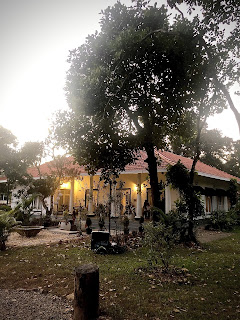On authenticity, travel and Crepe Ginger
Authentic. Soulful.
Like an increasing number of people, I am the kind of traveler who seeks to experience travel, and sometimes life itself, through the prism of these two descriptors.
Not for me the crowded streets of Las Ramblas or the crab curry at Newton Circus.
No. I want something that touches the soul. I want something authentic.
If you think about it though, these words approach the act of travel and of experience through two different perspectives. Soulful individualises the perspective. Makes it about you as a person and what it is in the world, or in a moment, that animates the part of you that lies numb and deadened by bright screens and dull conversations.
Authentic on the other hand usually represents a collective judgement. Is this rooted in time and place? Moored to history and culture? Grounded in blood and soil? Or is it pastiche? Created for our vacuous entertainment, the flotsam and jetsam of consumerism? And so we seek the authentic with the help of experts and arbiters of authenticity, the experts and the gurus, the experience companies and the packaged food walks and Dharavi tours, eventually becoming just another part of the hydra headed beast that is the global travel industry.
I have always felt there is a different kind of authenticity I sought but I didn’t know what exactly it was. I knew how it made me feel. But every time I tried to crystallise my thoughts and express them in words, I failed. The words, or even structured thought, remained elusive, fleeting drops of rain on the parched earth of my imagination.
Then last week, on a holiday in a home called Crepe Ginger at Chikmagalur it all came to me. I realised that the word authentic meant something very different to me, something very literal. The word authentic has a few different meanings in the dictionary. And while there are examples across the world of how it is always a third party that decides what is “authentic”, it is this very literal meaning of the word that resonated with me.. “representing one’s true nature or beliefs; true to oneself or to the person identified”.
Chikmagalur is coffee country in Karnataka heartland. The classic Chikmagalur experience is a home stay in an estate of many, many acres surrounded by lush coffee and pepper plantations, owned by people who have been in the coffee growing business for generations. The food is homely and local. Robust nati chicken curries and lots of rice and Kori rottis.
Crepe Ginger sits on just three acres of land without a coffee or pepper plant in sight. Its owners are Tamil and Manipuri, and only bought the land six years ago. They have no historical association to the place or memories of it. It was just overgrown wilderness in a village. The food can range from Naga inspired chutneys to butter chicken. For dessert their fourteen year old daughter often showcased her baking skills along with some Arun ice cream. The Athangudi tiles on the floor are from Tamil Nadu. By every traditional yardstick in the travel industry, it was spectacularly inauthentic.
And yet, despite numerous visits to Chikmagalur and my insatiable need for authenticity, this felt like the truest and most memorable holiday I have ever had in that region. Suba and Samar, the owners, built the home from scratch. They help clear every bush, plant every tree. They chose every brick and tile. They insisted on using only local workers. They lived on the property in the middle of the village and when the storms lashed at the fragile edifice on a dark night, Suba spent the night on a floor in the hut of the ageless ajji-ma who lives in the next plot of land. She got over her fear of snakes, even the cobras that sometimes basked lazily in the sun. And when it was built, the villagers all came to feast carrying little gifts from their homes and their farms and their trees, but most of all bearing the gifts of warmth and acceptance and inclusion.
A visit to Crepe Ginger may not have the Chikmagalur coffee experience. But it has a little stream where you can sit with your feet in the water, reading a book, looking up occasionally to see the butterflies fluttering in the breeze. You see Ajji-ma walk across the open gate and into the kitchen where she sits and shares stories with Suba and her staff while grinning her toothless, wrinkled, sparking smile. You sit over a bonfire and realise that Suba is either a mad woman or an inspiration, and maybe you need a bit of madness in you to be inspired enough to live a life less ordinary. You sit and you plan your meals and you realise that over a week you’ve experienced the local food and the local dishes and the local produce, but you’ve also seen them transformed into other dishes, comforting or creative, or sometimes both, like the raw cabbage and oranges and a bit of lime and some Naga chilli we had as a salad for lunch one day. You sit and see the sun go down over the Tunga river or the large moon light up the garden and the world seems to slow down and you breathe easily and sleep better. And you suddenly realise that though you’ve been there over a week, you don’t really want to go back. You realise that we don’t really want all the things we think we do and that we fill our lives with. That life is simpler than we make it. And more beautiful.
Somehow, you feel free of the noise and clutter and suddenly you see things with crystalline clarity, and you feel grateful because everything feels real. Everything feels authentic.









Comments